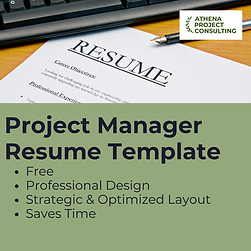When interviewing for a project manager position, asking insightful questions can help you assess if the organization and the role are a good fit for you.

Preparing questions for a hiring manager is a crucial part of the interview process. It not only shows your interest and preparedness but also helps you gather essential information to make an informed decision about your potential future with the company.
Demonstrates Interest and Enthusiasm:
Asking thoughtful questions shows that you are genuinely interested in the role and the company. It signals to the hiring manager that you have taken the time to research and understand the organization and are eager to learn more.
Assessing Fit and Alignment:
It allows you to gauge whether the role and the company align with your career goals, values, and work style. Understanding the company culture, team dynamics, and expectations helps you determine if you will thrive in that environment.
Clarifying Role Expectations:
Asking about the specific responsibilities, challenges, and success metrics of the role helps you gain a clear understanding of what is expected of you. This clarity can help you decide if the role is a good match for your skills and experience.
Evaluating Company Culture and Values:
Questions about company culture, values, and team dynamics provide insight into the work environment and the organization's priorities. This information is crucial for determining if the company's culture aligns with your personal and professional values.
Demonstrating Preparedness and Proactiveness:
Coming prepared with questions shows that you are proactive and have taken the initiative to think critically about the role and the company. It reflects well on your professionalism and readiness to engage in meaningful conversations about the position.
Building Rapport with the Interviewer:
Engaging in a two-way conversation by asking questions can help build rapport with the interviewer. It creates a more interactive and dynamic interview experience, which can leave a positive impression.
Understanding Growth and Development Opportunities:
Questions about professional development, training programs, and career progression opportunities give you a sense of how the company supports its employees' growth. This information is vital for your long-term career planning.
Assessing Company Stability and Future Prospects:
Inquiring about the company's future plans, challenges, and strategic goals provides insight into its stability and growth prospects. It helps you understand the potential for job security and long-term opportunities.
Making an Informed Decision:
The interview process is a two-way street. While the company evaluates you as a candidate, you are also evaluating the company as a potential employer. Having all the necessary information allows you to make a well-informed decision about whether to accept a job offer if one is extended.
Highlighting Your Analytical and Critical Thinking Skills:
The quality of your questions can reflect your analytical and critical thinking abilities. Thoughtful and relevant questions demonstrate that you are capable of considering various aspects of the role and the organization.
Here are 24 thoughtful questions to ask a hiring manager during an interview:
Standardization of Processes:
How does the organization establish standardized project management methodologies, tools, and templates?
What steps are taken to ensure consistent practices across all projects?
Improved Project Success Rates:
How does the organization work to increase the percentage of projects completed on time, within budget, and meeting quality standards?
What measures are in place to reduce project failures through better risk management and resource allocation?
Enhanced Governance and Oversight:
How does the organization implement robust governance frameworks to oversee project progress and performance?
What processes are in place to ensure compliance with regulatory requirements and organizational policies?
Resource Optimization:
How does the organization ensure efficient allocation and utilization of resources across projects?
What strategies are used to balance resource demand and capacity to prevent overallocation or underutilization?
Increased Transparency and Visibility:
How does the organization provide clear visibility into project statuses, risks, and issues through regular reporting?
What methods are used to enhance stakeholder communication and engagement?
Improved Decision-Making:
How does the organization leverage accurate and timely project data to support informed decision-making?
What data-driven approaches are implemented for prioritizing and selecting projects?
Enhanced Risk Management:
How does the organization identify, assess, and mitigate project risks proactively?
What measures are taken to reduce the impact of unforeseen events on project outcomes?
Continuous Improvement:
How does the organization foster a culture of continuous improvement through lessons learned and feedback loops?
What actions are implemented to enhance future project performance?
Better Alignment with Strategic Objectives:
How does the organization ensure projects align with its strategic goals and objectives?
What processes are in place to prioritize projects that deliver the highest value to the organization?
Cost Savings and Efficiency Gains:
How does the organization work to reduce project costs through improved planning, execution, and control?
What strategies are used to enhance operational efficiency by eliminating redundancies and optimizing processes?
Improved Stakeholder Satisfaction:
How does the organization enhance stakeholder confidence and satisfaction through reliable project delivery?
What methods are used to build strong relationships with stakeholders by meeting their expectations and requirements?
Scalability and Flexibility:
How does the organization create a scalable PMO framework that can adapt to its growth and changes?
What steps are taken to ensure flexibility to accommodate different project types and complexities?
These questions can help you gain a comprehensive understanding of the role, the team, and the organization, allowing you to make an informed decision about whether the position aligns with your career goals and work style.
About the Author
Lori Schoenhard is the Founder and Principal of Athena Project Consulting, LLC.
Lori possess two decades of IT leadership expertise, building and leading Project Management Offices (PMO), managing complex global enterprise programs across cross-functional teams, spearheading change management initiatives, and providing coaching to program and project managers. She has worked with Fortune 500 companies, SaaS companies, digital agencies, and SMBs to deliver impactful results.
Lori holds several project management and industry certifications: PMP, CSM, CSPO, SAFe, ITIL. Lori holds a Masters Degree from Boston University in Computer Information Systems and IT Project Management.

.png)

.png)




















Comments